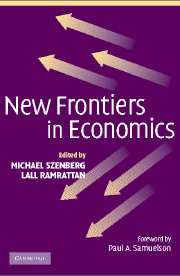Book contents
- Frontmatter
- Contents
- List of Contributors
- Foreword by Paul A. Samuelson
- Preface
- Acknowledgments
- Introduction
- PART I INFORMATIONAL BEHAVIORAL ECONOMICS AND FINANCE
- PART II MACROECONOMICS AND PUBLIC POLICIES
- 5 Whither Macro?
- 6 Recent Developments in and Future Prospects for Public Economics
- PART III INTERNATIONAL TRADE AND DEVELOPMENT
- PART IV CONTRACTS, LAW, AND GAMING
- Author Index
- Subject Index
- References
6 - Recent Developments in and Future Prospects for Public Economics
Published online by Cambridge University Press: 06 July 2010
- Frontmatter
- Contents
- List of Contributors
- Foreword by Paul A. Samuelson
- Preface
- Acknowledgments
- Introduction
- PART I INFORMATIONAL BEHAVIORAL ECONOMICS AND FINANCE
- PART II MACROECONOMICS AND PUBLIC POLICIES
- 5 Whither Macro?
- 6 Recent Developments in and Future Prospects for Public Economics
- PART III INTERNATIONAL TRADE AND DEVELOPMENT
- PART IV CONTRACTS, LAW, AND GAMING
- Author Index
- Subject Index
- References
Summary
Public economics is the study of the government's role in the economy. Because that role is constantly changing, public economics is a constantly evolving field. Some of the field's core questions – such as how the tax rates on different goods should be set – transcend generations, whereas others, such as how best to reform the aging Social Security systems in many developed nations, have recently emerged as central topics. New insights from theoretical and empirical advances in many other subfields of economics help to inform long-standing issues in public economics. In turn, the emerging issues within the field often provide the stimulus for new theoretical and applied research.
The last few decades have been a period of very rapid advancement in public economics. Important new theoretical and empirical discoveries have substantially advanced our understanding of the efficiency and incidence of various taxes, as well as the economic effects and optimal design of social insurance programs. There has been substantial progress in both the economic theory that relates to public economics, and in the empirical analysis that supports detailed policy evaluations.
Different parts of public economics have advanced at different rates. In the early 1970s, the major research advances involved the application of economic theory to the second-best problems of tax design. In the late 1970s and 1980s, the advent of household-level and firm-level databases permitted new exploration of how tax incentives and other factors affected the behavior of economic agents.
- Type
- Chapter
- Information
- New Frontiers in Economics , pp. 185 - 202Publisher: Cambridge University PressPrint publication year: 2004



